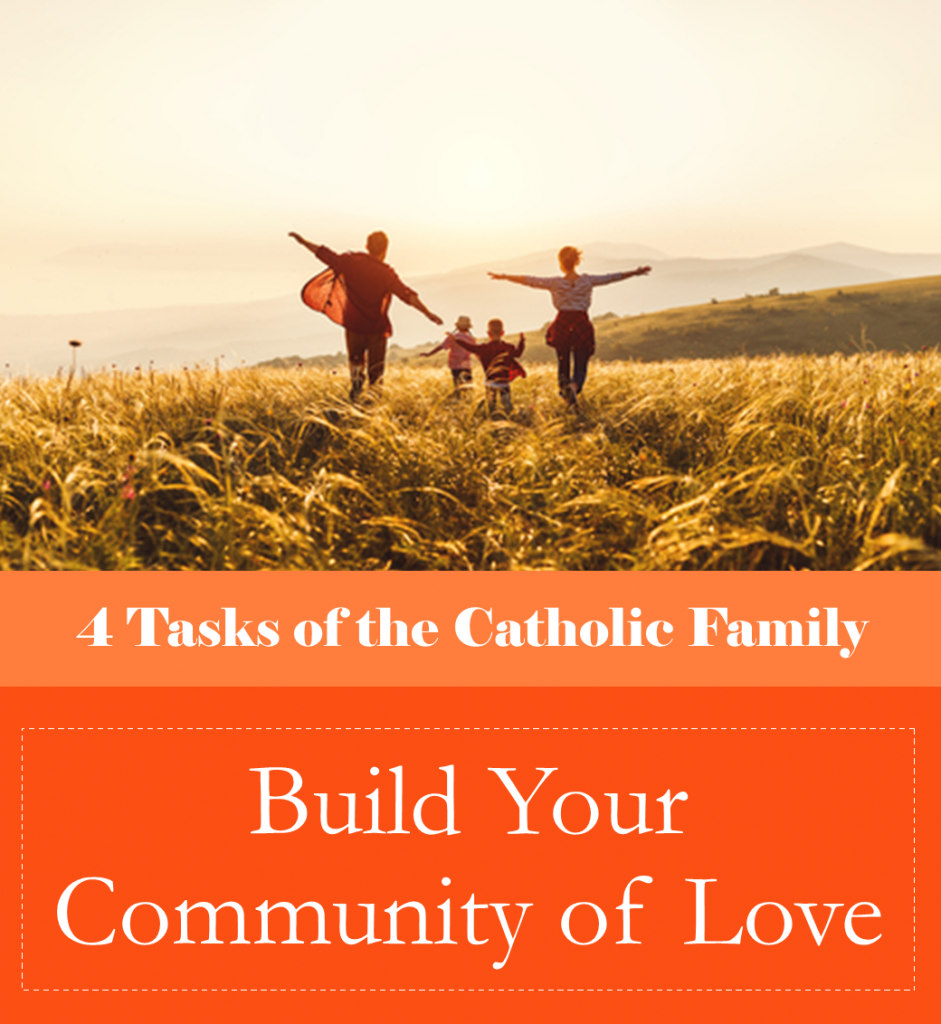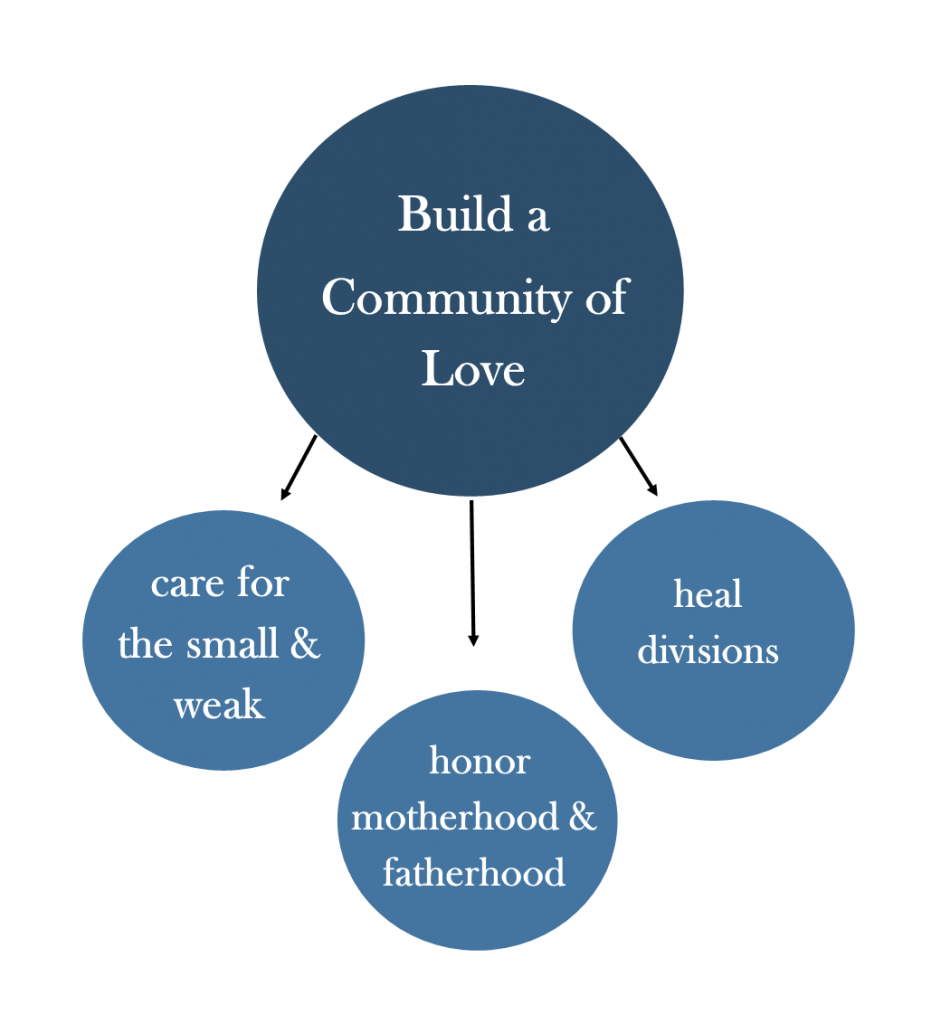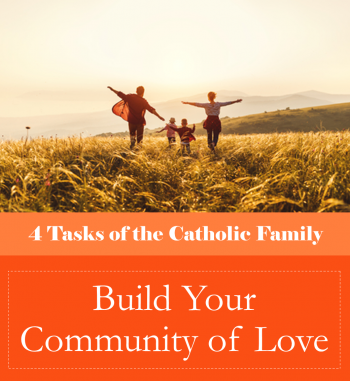
Tasks of the Catholic Family Series
- Build Your Community of Love (this article)
- How Families Can “Serve Life”
- How Families Can Change Society
- How Families Can Serve the Church
****
How can busy families discern how we should spend our time? What guidelines can help us as we consider taking on new commitments or responding to new opportunities at work, or in our community or parish?
When filling our family’s calendar, we can remind ourselves of our identity and mission as Catholic families: We are the domestic church imaging the universal Church in her mission of transforming the world. St. Pope John Paul II’s historic apostolic exhortation Familiaris Consortio outlines four essential tasks that express and actuate our mission.
This article will kick off a four-part series exploring these four tasks as outlined by JP2 (because I just couldn’t do it justice in one article!!). The four tasks are:
- build a community of love
- serve life
- participate in the development of society
- share in the life and mission of the Church
Phew! These may seem like lofty tasks for our ordinary families. But when we examine them closely we see that JP2 gives us purpose and direction through these four tasks.
Today I’ll summarize the first task (build a community of love) as JP2 explains it, and I’ll suggest some practical ways we can move closer to fulfilling our mission by practicing this task.
Our First Task: Build a Community of Love

Catholic families are called to build a community of love, with spousal love as the foundation. The mutual self-donation between mom and dad serve as a model for their children. From that foundation, parents can lead the children in offering their own gift of self for the sake of others in the family and beyond.
Caring for the Smallest and Weakest
Families are called to what is really a supernatural kind of communion. It must be built on prayer and “it can only be preserved and perfected through a great spirit of sacrifice.” The notion of sacrifice is almost odd today. In our me-me-me culture, too often people focus on what they are owed rather than how they can serve. Let’s not let this attitude infect our homes.
What can family members do for one another each day to ease one another’s burdens? How do we begin? In Familiaris Consortio, the pope urges to care for the needs of the smallest, weakest, and most infirm in our homes:
All members of the family, each according to his or her own gift, have the grace and responsibility of building, day by day, the communion of persons, making the family “a school of deeper humanity”: this happens where there is care and love for the little ones, the sick, the aged; where there is mutual service every day; when there is a sharing of goods, of joys and of sorrows (FC 21).
Even children have gifts and graces that allow them to care for their younger siblings or for sick family members. What are our children’s unique gifts? Are they great artists? Lego builders? Basketball stars? Cupcake decorator? We can lead our children in using these gifts to bless their siblings. They could make special gifts for their siblings or use their gifts to lead younger siblings in a project or activity.
In my home, inspired by John Paul II’s call to prioritize the needs of the weakest persons in any society or community (Sollicitudo Rei Socialis, 39), I explain to my older children that sometimes they have to wait to have their legitimate needs met because an infant, toddler, or sick child has more urgent needs. This means sometimes older or healthier children have the opportunity to practice the virtues of patience and generosity. Admittedly, sometimes this can be frustrating for these kids, just as it’s hard for grown-ups when we have to wait!
When I first began sharing this principle with my friends and readers, a few folks took it the wrong way. They created a rule: “young kids first, big kids second,” period. But, in my experience, we have to be very prudent in applying this principle in our homes; family life can’t be lived like a formula or recipe. Sometimes older children are in distress (perhaps due to a fight with a friend or a disappointing performance in school), and their needs are more urgent. For example, if I had a toddler who needed a snack and a teenager who was crying in her bedroom, I would attend to the teenager first, because the teenager’s needs are more urgent.
In short, I feel a duty to ensure that I also meet the needs of these older/healthier kids so they don’t feel like they are always giving and never receiving what they need. I also have to set aside time to celebrate these children who practice heroic virtue on an almost daily basis. I take them out alone for ice cream, buy them little gifts when I come across them so they know they are special to me.
Healing the Wounds of Division
Of course, we are imperfect, fallen creatures. Selfishness, discord, tension, and other conflicts can “wound” our family communion. Think of the common sources of conflict in our families.
- Husbands and wives might argue about money (how should money be spent), chores (who should do what chores, and who does more chores), and time (how much time do we each need alone, how often should we go out together and leave the kids homes, etc).
- Parents and kids have conflicts about the same things. Kids can get the gimmes, they can resist doing chores, and they can disagree with our boundaries about how they spend their time (technology, friends, schoolwork).
- And let’s not forget sibling conflict! Kids can argue about whose turn it is with a toy, who gets to sit on our lap, or even who’s taller!
Our families don’t have to wait until we get our acts together before we start living our mission! We’re called to live out our mission even in the midst of these tensions. Remember: the disciples had conflict; brothers and sisters in religious orders have conflict. Yes, family members in our domestic church will have conflict. The key to whether we continue in our mission, growing as a community of love, depends on how we resolve conflict.
I have some resources to recommend for conflict resolution within the domestic church. For spouses, I highly recommend John Gottman’s books on resolving marital conflict and improving communication. According to Gottman, having marital disagreements isn’t the problem; the problem is how we talk to each other when we disagree. For communication between parents and children, I have a problem-solving section in the discipline chapter of my book Discipleship Parenting. For sibling squabbles, I love Dr. Laura Markham’s Peaceful Parent, Happy Siblings.
And we must avail ourselves of the sacraments together frequently. God calls us the “joyous and renewing experience of reconciliation” so unity can be restored. Participating in the Eucharist and the sacrament of Confession should ground our family schedules, so we receive the graces we need to overcome all divisions.
Honoring Motherhood and Fatherhood
Pope John Paul II affirms the equal dignity of mothers and fathers in Familiaris Consortio. After articulating the societal injustices women have faced historically by being excluded from the workplace, JP2 supports the right of women to work and to bring their gifts to the public square. On the other hand, he’s concerned about mothers being forced to work due to financial strains or feeling compelled to work because society devalues the vocation of motherhood. All moms work, whether or not they hold a job outside the home for pay!
While it must be recognized that women have the same right as men to perform various public functions, society must be structured in such a way that wives and mothers are not in practice compelled to work outside the home, and that their families can live and prosper in a dignified way even when they themselves devote their full time to their own family.
Furthermore, the mentality which honors women more for their work outside the home than for their work within the family must be overcome. This requires that men should truly esteem and love women with total respect for their personal dignity, and that society should create and develop conditions favoring work in the home (FC 23).
Spouses are best able to determine whether, when, and how much mom will work outside the home, but there is no question that mothers have an indispensable role in protecting the heart of the home and rearing children, especially very young children. In my book, I share my own journey toward leaving my legal career and becoming a full-time mother, but this isn’t the choice every mother should or can make.
No matter where mom spends most of her time, we should be concerned about the attitude toward mothering in society. What can we do to influence social policy so the work of mothers in the home is “favored” as JP2 suggests? This question deserves our attention as Catholic couples.
JP2 also affirms the special vocation of fatherhood, which is complementary to motherhood. Fathers are a sign of the protection and generosity of God the Father:
In revealing and in reliving on earth the very fatherhood of God, a man is called upon to ensure the harmonious and united development of all the members of the family: he will perform this task by exercising generous responsibility for the life conceived under the heart of the mother, by a more solicitous commitment to education, a task he shares with his wife, by work which is never a cause of division in the family but promotes its unity and stability (FC 25).
Mothers tend to be the leaders of the faith formation of their children, but JP2 urges fathers to share this responsibility, particularly with the witness of their virtue and prayer life. Families in which the father is a strong spiritual leader is itself a sign of hope in an increasingly secularized world. Some dads don’t think they can respond to this invitation; they feel ill-prepared and unsure what their spiritual leadership should look like. Dr. Greg Popcak has this book about fathers and the beatitudes. I’ve read favorable reviews of this book on Godly fatherhood, written by a Lutheran dad.
Living in the world, we will experience a disconnect between how the world views us as mothers and fathers, and how God views us. Because our children absorb our own attitudes toward what it means to be a mother or a father, we must resolve this conflict within ourselves. For our children’s sake, we want to honor parenting as a true vocation and live it with greater clarity and zeal.
Resources
Familiaris Consortio with commentary.
4 Deadly Horsemen of Marriage. In this podcast, I explained the 4 communications habits spouses should avoid. I draw on Gottman’s insights.
A Catholic Working Mom’s Guide to Life by Joanna Wahlund. Encouragement for working Catholic moms. “Whatever their unique circumstances, all Catholic working moms have three things in common: (1) They are Catholic, striving to live out the Faith in every aspect of their lives. (2) They are working, some by choice, and some by necessity. (3) Most prominently, they are mothers — knowing that’s the most important responsibility they will ever have.”
Image credit: Evgenyatamanenko at dreamstime.com

